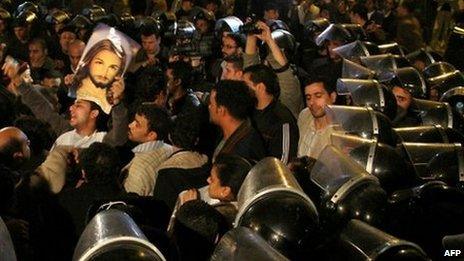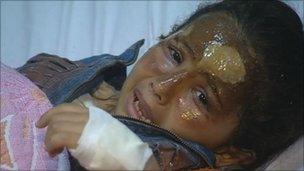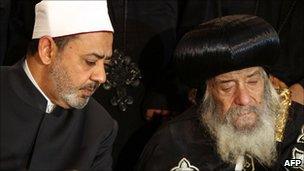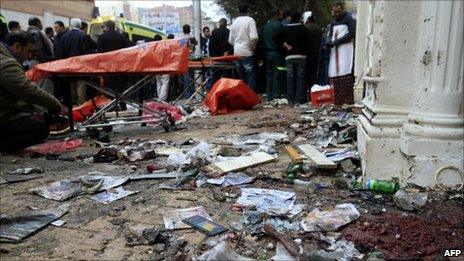Egypt Copts angry after Alexandria church bomb
- Published

Clashes between angry Copts and police have occurred almost daily since the attack
In St Mark's hospital in Alexandria, Egypt, some of those injured by a New Year's Day bomb attack on a Coptic church lay and hope for a recovery.
Seven-year-old Clara cries out in agony at the slightest movement.
Her face and legs are charred and blistered from Saturday's blast, which killed at least 21 people and injured dozens more in Alexandria, on Egypt's north coast.
In the neighbouring bed her mother weeps silently as she witnesses her daughter's pain. Her legs too are heavily bandaged.
"Whoever did this, they are not human beings," she says. "They are not people, they are animals."

Agony and distress - Clara in her bed at St Mark's hospital in Alexandria
Upstairs in the intensive care unit, a man in his 60s, Michel Sadek, still cannot believe what happened.
"We were just praying. These were good people who never hurt anybody," he says. "This was terrorism."
A doctor in the ward shows me pieces of shrapnel that have been removed from victims' bodies.
The Alexandria bomb was packed with old nuts and bolts, and was designed to cause maximum harm.
"When I arrived at the hospital on the night of the attack, there was blood and bodies everywhere. We could not cope with the number of casualties," he recalls.
'Covered in blood'
Riot police now surround al-Qiddissin, or Saints' Church, the site of Saturday's attack.
Security footage it has released shows the moment a little after midnight when the bombers struck during a well-attended mass service.
The explosion nearly blew in the doors.
Now workers are finishing the clean-up, sweeping broken glass from the floor.

Religious leaders show unity in wake of an unprecedented attack on Egypt's Christians
"You can see the windows were all broken, the facade was also damaged and covered in blood," points out a church official.
Still in a state of shock, worshippers file in, dressed in black, to light candles and attend prayer services to remember the dead.
Several of them also come to show photographs of the horrific carnage that they took on their mobile phones.
There have been sporadic clashes between Egypt's majority Muslim population and Coptic Christian minority for years, with a recent spike in violence.
But never before has there been an attack on the scale of what happened at the very start of this year.
Display of unity
It seems those responsible wanted to inflame tensions and hatred between Egypt's eight million Christians and more than 70 million Sunni Muslims.
On Egyptian state TV, Coptic leader Pope Shenouda III and the head of the country's top Muslim institution, al-Azhar, made a very public display of unity.

Officially the attack has been blamed on "foreign hands"
Like the Egyptian government that blames "foreign forces", they suggest outsiders were behind the bombing.
"This tragedy targeted the security of all Egyptians," said Grand Sheikh Ahmed al-Tayeb.
"Therefore all Egyptians, and I will not say Muslims and Copts, but all Egyptians together, are being called up to take each other's hands."
However, on the streets of Alexandria and Cairo, the crowds of Coptic protesters have been in no mood to hold hands.
They are angry and want revenge. Many believe their community is increasingly discriminated against and that threats to their security are not taken seriously.
They question why there was not better protection to church buildings, particularly following recent threats from al-Qaeda.
The Saints' church in Alexandria was just one named on a list of places of worship suggested as a possible target that was published on the internet.
With Coptic Christmas just a few days away, on 7 January, there is a fear among Egyptian Christians that the bombers, whether home-grown or foreign, may be preparing to strike again.
- Published3 January 2011
- Published3 January 2011
- Published3 January 2011